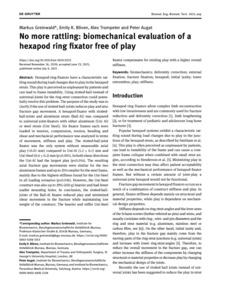Greinwald, M; Bliven, EK; Trompeter, A; Augat, P
(2021)
No more rattling: biomechanical evaluation of a hexapod ring fixator free of play.
Biomed Tech (Berl), 66 (5).
pp. 529-536.
ISSN 1862-278X
https://doi.org/10.1515/bmt-2020-0323
SGUL Authors: Trompeter, Alex Joel
![[img]](https://openaccess.sgul.ac.uk/113714/7.hassmallThumbnailVersion/TL-Hex-StudyA_FinalPublication_10.1515_bmt-2020-0323.pdf)  Preview |
|
PDF
Published Version
Available under License ["licenses_description_publisher" not defined].
Download (2MB)
| Preview
|
Abstract
Hexapod-ring-fixators have a characteristic rattling sound during load changes due to play in the hexapod struts. This play is perceived as unpleasant by patients and can lead to frame instability. Using slotted-ball-instead of universal-joints for the ring-strut connection could potentially resolve this problem. The purpose of the study was to clarify if the use of slotted-ball-joints reduces play and also fracture gap movement. A hexapod-fixator with slotted-ball-joints and aluminum struts (Ball-Al) was compared to universal-joint-fixators with either aluminum (Uni Al) or steel struts (Uni Steel). Six fixator frames each were loaded in tension, compression, torsion, bending and shear and mechanical performance was analyzed in terms of movement, stiffness and play. The slotted-ball-joint fixator was the only system without measurable axial play (<0.01 mm) compared to Uni-Al (1.2 ± 0.1) mm and Uni-Steel (0.6 ± 0.2) mm (p≤0.001). In both shear directions the Uni-Al had the largest play (p≤0.014). The resulting axial fracture gap movements were similar for the two aluminum frames and up to 25% smaller for the steel frame, mainly due to the highest stiffness found for the Uni-Steel in all loading scenarios (p≤0.036). However, the Uni-Steel construct was also up to 29% (450 g) heavier and had fewer usable mounting holes. In conclusion, the slotted-ball-joints of the Ball-Al fixator reduced play and minimized shear movement in the fracture while maintaining low weight of the construct. The heavier and stiffer Uni-Steel fixator compensates for existing play with a higher overall stiffness.
| Item Type: |
Article
|
| Additional Information: |
© 2021 Walter de Gruyter GmbH, Berlin/Boston |
| Keywords: |
biomechanics, deformity correction, external fixation, fracture fixation, hexapod, initial laxity, lower extremities, play, stiffness, biomechanics, deformity correction, external fixation, fracture fixation, hexapod, initial laxity, lower extremities, play, stiffness, Biomedical Engineering, 0903 Biomedical Engineering |
| SGUL Research Institute / Research Centre: |
Academic Structure > Institute of Medical, Biomedical and Allied Health Education (IMBE) |
| Journal or Publication Title: |
Biomed Tech (Berl) |
| ISSN: |
1862-278X |
| Language: |
eng |
| Publisher License: |
Publisher's own licence |
| PubMed ID: |
34243227 |
| Dates: |
| Date |
Event |
| 2021-10-26 |
Published |
| 2021-07-09 |
Published Online |
| 2021-06-23 |
Accepted |
|
 |
Go to PubMed abstract |
| URI: |
https://openaccess.sgul.ac.uk/id/eprint/113714 |
| Publisher's version: |
https://doi.org/10.1515/bmt-2020-0323 |
Statistics
Item downloaded times since 01 Oct 2021.
Actions (login required)
 |
Edit Item |



